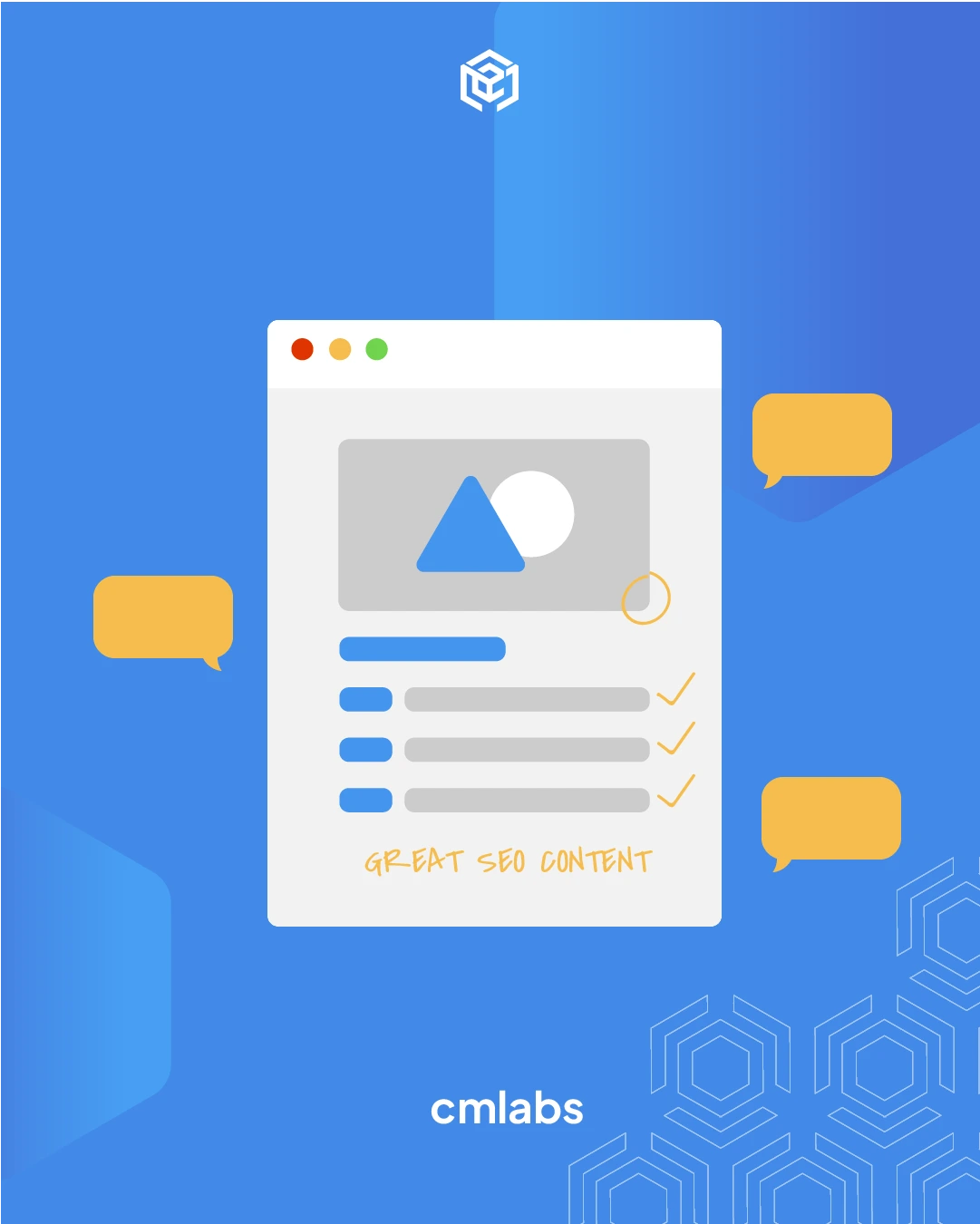We use cookies
This site uses cookies from cmlabs to deliver and enhance the quality of its services and to analyze traffic..
SEO SERVICES
Conduct in-depth technical website audits, strategically develop website projections, and increase your website authority.
ASO SERVICES
Elevate Your App’s Presence with Our Expert ASO Services – Boost Visibility and Drive Downloads!
WRITING SERVICES
We offer a variety of writing services to suit different business necessities. Reach broader audiences or lead specific industries? We've got you covered!
SEOlutions
A unified source of truth!
SEO & Digital Maternity Solution
SEO & Digital Maternity Solution: Leverage Cross-Platform Insights to Elevate Your Strategy with Expert Consultation
SEO & Digital Maternity Solution
Data Solution options:
Starting from Rp200 mio
Reinventing how a company get creative treatments
A new way to get your creative needs done. Agile team, efficient cost, and expedient way in a flexible yet scalable subscription plan!
Creative-as-a-Services
CaaS package options:
Based on Subscription
Pioneer in digital marketing software powerhouse
We’re excited to unveil our new range of Tech Solutions designed to drive your digital success. Whether you’re looking to enhance your website’s performance, streamline your tech stack, or unlock deeper insights from your data, we’ve got you covered.
Starting from Rp250 mio
Our Clients
Research and innovation center for digital transformation
Digital marketing combines technical skills and business knowledge at every stage. For marketing teams, improving budget management efficiency is crucial, as time is an invaluable resource that should be used wisely. At Sequence, we are dedicated to empowering you to optimize efficiency and strategic planning, ultimately enhancing the impact of your digital marketing efforts.
Subscription-based (IDR1,800/keyword)
Our Clients
BeyondSEO
References
SEO Tools for Webmasters
SEO Tools for Writers
SEO Tools
FIND THE SUITABLE PARTNERSHIP FOR YOUR COMPANY
Check out which cmlabs partnership program suits your company
WHITE LABEL SEO
for CorporateYour company is granted exclusive partnership rights to provide SEO services to our important clients, and we will provide a dedicated backend team to support your efforts.
AFFILIATE PROGRAM
for BizdevA new affiliate program is being introduced for skilled marketers and individuals with strong networks, offering commissions of up to 7% for generating profits independently.
DIGITAL AGENCY
for Marketing Partnerscmlabs is an essential partner for digital agencies, providing a unique selling proposition in Search Engine Optimization (SEO).
BACKLINK PARTNERSHIP
for Media / BloggerWe have a vast database of bloggers and media outlets across Indonesia, categorized by region and media type, giving our clients an edge in managing their media and SEO activities.
OFFICIAL TRAINING
We provide ongoing professional development and support to SEO professionals to ensure they are equipped to meet market demands.
JOIN AS CONTRIBUTOR
for Content WriterGreat opportunity for SEO Writers around the world. T&C applied!
ACADEMIC PARTNERSHIP
Through partnerships with universities in Indonesia, cmlabs has helped align academic curricula with industry demands.
Partnership
Sector & Industries
Tell us your SEO needs, our marketing team will help you find the best solution
As an alternative, you can schedule a conference call with our team
Schedule a Meeting?Contact
Survey
We use cookies
This site uses cookies from cmlabs to deliver and enhance the quality of its services and to analyze traffic..
Last updated: Aug 14, 2024
Hypertext Markup Language or abbreviated as HTML is a standard markup language to create a web page. HTML was originally developed at CERN (Conseil Européen pour la Recherche Nucléaire; European Organization for Nuclear Research) by Tim Berners-Lee around 1990.
In a simple simulation, a browser receives an HTML document from the web server or local storage, then it will run a document rendering to the multimedia web
HTML will portray the web page structure in a semantic way and account for the early “sign” for the document interface.
It is important for a beginner to know that the HTML element is a block for the HTML page builder. What is an HTML page builder?
With the construction of an HTML block, images, text, and other HTML objects can be inserted into a page. These elements also supply a facility to create documents or structured text such as post, paragraph, list, link, cite, or other tags.
<!DOCTYPE html>
<html>
-- Header --
<head>
<title>This is a title</title>
</head>
-- Body --
<body>
<p>Hello world!</p>
</body>
</html>| HTML 2 - November 24, 1995 |
| HTML 3 - Januari 14, 1997 |
| HTML 4 - Desember 18, 1997 |
| HTML 5 - Oktober 28, 2014 |
Note: each version of the HTML above has more sub-versions, such as 4.0 and 4.1. We only provide a summary of the significant versions.
In general, HTML components are divided into three points namely tags, elements, and attributes.
The HTML tag is a sign that becomes the prefix and suffix in HTML commands. Each tag has a different use. Writing tags begin and end with brackets <..> and there is a tag name in it. In HTML, tags are used in pairs including the opening <..> tag and the closing </..> tag.
Until now there are about 250 HTML tags, some HTML tags that you need to know are:
| Tag | Tag's Function |
|---|---|
| <html> </html> | to initiate the creation of an HTML page containing content and elements |
| <head> </head> | to create a head section containing titles, resources, and meta tags |
| <title> </title> | to make the website title displayed at the top of the browser window |
| <body> </body> | to write the body |
| <p> </p> | to create a paragraph in an HTML page |
| <h1> to <h6> | to create heading tags |
| <!-- --> | to create comments |
Table 1: Examples of some HTML tags and their functions.
Elements are the components that make up an HTML page. An HTML element can consist of an opening tag, a body tag, and a closing tag. Sometimes it also has attributes. For example, an element may consist of an opening <p> tag indicating the paragraph element, an attribute such as align="center", a body or text tag of "Hello World", and a closing </p> tag to end the paragraph element.
An element can also contain other HTML elements or commonly called nested elements. Consider the following example of writing nested HTML elements:
<html>
<body>
<p align="center">Hello world!</p>
</body>
</html>Attributes are additional information contained in HTML elements. Attributes function to clarify the command tag in the element. A tag can have more than one attribute, although not all attributes can be used in the same tag. Look at the following HTML code.
<img src="bunga-mawar.jpg” alt="10 tangkai bunga mawar berwarna merah"></img>From the example above, it can be seen that the <img> tag has two attributes, namely src, and alt. This shows a command so that the browser displays an image from the rose-flower.jpg file with the alt text containing "10 red roses".
Some HTML tags that you can use to optimize your website include:
Title tags are the title text that will be displayed at the top of the browser window. Make sure the title tags contain keywords that are relevant to the content of the page. Note the writing of the following title tags.
<head>
<title>HTML Tags untuk Optimasi Website</title>
</head>One of the most important meta tags is the meta description which contains a brief description of the information presented on a web page. The meta description must be attractive and contain keywords. The recommended length is around 400 – 750 pixels only.
An example of writing meta tags in HTML is as follows.
<head>
<meta charset="UTF-8">
<meta name="description" content="HTML adalah markup standar untuk membuat halaman web.
Dalam artikel ini kami akan membahas pengertian, komponen, serta HTML tags untuk
optimasi web.">
<meta name="keywords" content="HTML, SEO, Website">
<meta name="author" content="John Doe">
<meta name="viewport" content="width=device-width, initial-scale=1.0">
</head>Heading tags show the structure of the content that making it easier for readers and search engines to understand the information in the content. HTML tags have 6 categories of heading tags ranging from H1 to mark the most important things, to H6 for the least important things. Consider the following code example heading tags.
<h1>Heading 1</h1>
<h2>Heading 2</h2>
<h3>Heading 3</h3>
<h4>Heading 4</h4>
<h5>Heading 5</h5>
<h6>Heading 6</h6>To attach images to a page, you can use images and alt tags. It makes it easier for search engines to understand the multimedia on your page. That way, your content can be indexed well by search engines so that the performance of the website will get better.
<img src="kucing.jpg” alt="gambar seekor kucing yang sedang mengejar bola"></img>Hyperlink or anchor text is usually used to add text that contains a link to a particular page. To optimize the website, make sure the words you use in the anchor text are relevant to the intended web page. Example of a hyperlink:
<a href="https://cmlabs.co/id-id/seo-guidelines/seo-on-page">Panduan SEO On-Page</a>No follow is a tag in HTML used to prevent Google from following pages that are linked in an anchor text. This attribute can avoid Google penalties when linking low-quality links. Consider writing the link rel="no follow" attribute below:
<a href="https://cmlabs.co/id-id/seo-guidelines/seo-on-page" rel="nofollow">Panduan SEO On-Page</a>WDYT, you like my article?
Couldn't find result for "Mulki" try to search with different keyword
Suggestion:
Tell us your SEO needs, our marketing team will help you find the best solution
As an alternative, you can schedule a conference call with our team
Schedule a Meeting?



cmlabs Jakarta Jl. Pluit Kencana Raya No.63, Pluit, Penjaringan, Jakarta Utara, DKI Jakarta, 14450, Indonesia
(+62) 21-666-04470These strategic alliances allow us to offer our clients a wider range of SEO innovative solutions and exceptional service.

Psst! Hey there, SEO Stats and Tools SEO company! If you've ever planned of conquering the United Arab Emirates market, you've come to the right place!